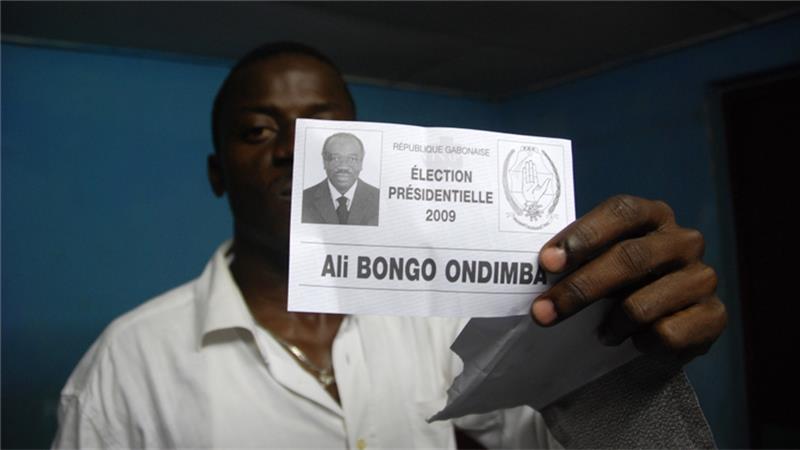Gabon election: Jean Ping lays claim to presidency win

Gabon’s opposition presidential candidate Jean Ping has claimed victory over incumbent President Ali Bongo, whose family has ruled the oil-rich African nation for nearly half a century.
“The decision taken by the population is known now by everybody,” Ping told Al Jazeera on Sunday. “Gabon is a small country so it is possible to know all the results right now,” he said.
Ping, 73, said that he declared himself winner to prevent 57-year-old President Bongo from manipulating the results.
“They are going to re-make the same thing which happened in 2009,” he said, referring to Bongo’s contested victory in the presidential poll seven years ago.
“That means to cheat. Not to proclaim the results right now but to continue to try to manipulate the results. We don’t want such a situation to happen. That’s why we are trying to prevent,” Ping said.
Earlier on Sunday, Ping had told supporters in the capital Libreville that he was winning the presidential vote.
“The general trends indicate we’re the winner of this important presidential election,” Ping said according to Reuters news agency.
The opposition leader made his victory declaration despite warnings by the country’s interior minister against candidates giving results ahead of their official announcement on Tuesday.
Responding to Ping’s claims, Bongo said that he was “calmly” waiting for the results, while his campaign said they were confident he will hold on to power.
“We respect the law … so we are waiting calmly for Cenap (the national election commission) to announce the results of the election,” Bongo told a crowd of supporters on Sunday, according to AFP news agency.
Official results from Saturday’s vote are not due out until 1600 GMT on Tuesday and candidates are prohibited by law from making announcements on the likely outcome.
Igor Simard, Bongo’s spokesman, said that nobody could claim victory when votes were still being counted by the authorities.
“The fight is tight but we are confident our candidate will win,” Simard told Al Jazeera.
“What gives us confidence is that the remaining constituencies to be declared are traditionally our strongholds,” he said.
The head of the Pan-African Democracy Observatory, an NGO based in neighbouring Togo, downplayed the significance of Ping’s declaration.
“We should not be surprised if one or the other declare victory. It’s all part of the game,” Djovi Gally told reporters.
Gabon’s one-round electoral system means the winner simply requires more votes than any other candidate.
In 2009, Bongo won with 41.73 percent of the vote.
Oumar Ba, a political analyst, told Al Jazeera that a Ping victory would be “a major shift in Gabon” and also for African politics in general, particularly if Bongo accepts defeat and hands over power.
Bongo is also capable of holding on to power, Ba said.
“If Bongo wants to hold on to power he has the machine that will allow him to do so,” said Ba, explaining that the country’s electoral commission is not entirely independent, and the constitutional court, which would adjudicate challenges to the result, is made up of judged appointed by Bongo.
Ping and Bongo family ties
A former foreign minister and African Union Commission (AUC) chairman, Ping was a close ally of the incumbent president’s father, Omar Bongo, who ruled for 42 years until his death in 2009.
Ping and the younger Bongo worked for years together under Bongo senior, who was responsible for getting the current opposition leader his job as chairman of the AUC.
Ping also has close family ties to the Bongo dynasty: he was formerly married to Omar Bongo’s eldest daughter with whom he had two children.
But, Ping turned on Bongo junior in 2014, and in March he told French daily Le Monde that “Gabon is a pure and simple dictatorship in the hands of a family, a clan”.
On Sunday, the streets of Libreville were almost deserted. Fearing a repeat of the violence that followed Bongo’s contested victory in 2009, many residents, who had stocked up on food, stayed indoors. Shops and stalls usually open on Sundays were shuttered.
In the clashes that followed Bongo’s 2009 victory, several people were killed, buildings were looted and the French consulate in Port Gentil, which saw the worst of the violence, was torched.
An oil producer with a population of less than two million, Gabon is one of Africa’s richest countries.
However, declining oil output and falling prices have resulted in budget cuts and provided fodder for opposition claims that average people have struggled under Bongo’s leadership.
Al Jazeera